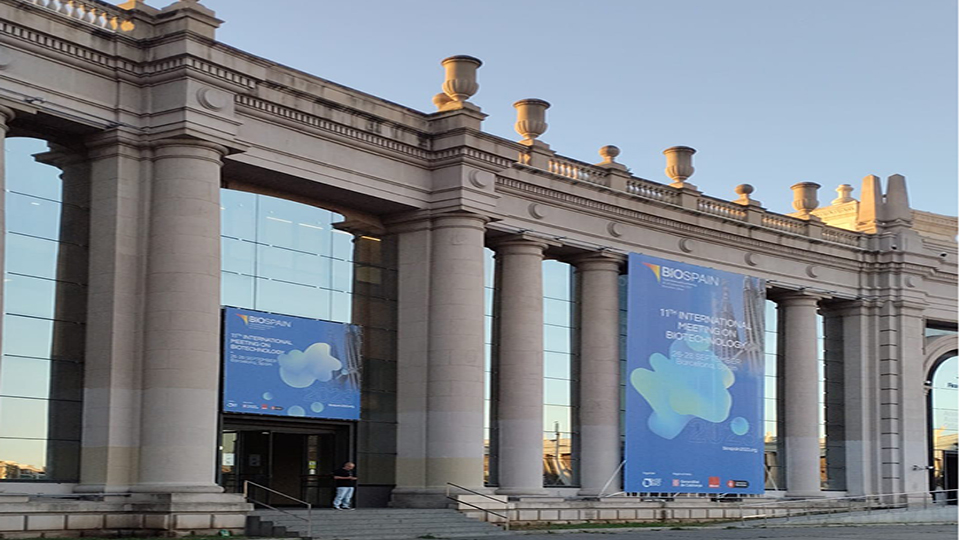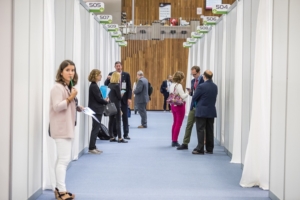
BioSpain breaking records
With more than 2,100 attendents, 4,700 partnering meetings so far, BioSpain 2023 is set to break records.
On its 20th anniversary in Catalonia’s vibrant capital Barcelona, BioSpain 2023 is set to break records in terms of attracting visitors, internationalisation and exhibitors. In terms of numbers, BIOSPAIN 2023 surpasses 2,100 attendees and boasts over 220 exhibitors – an environment that offers opportunities for collaboration among the 975 companies from over 30 nations and more than 100 investors that will come together at the sector meeting. At present, the number of one-to-one meetings stands at 4,700.
Pointing to the success biotech innovation has proven in the COVID-19 pandemic, Ana Polanco, President of Asebio, the organiser of BioSpain 2023, stress that this is the century of biotechnology. In her opening speech, Polanco pointed out that biotech as a platform technology not only is a driver for the biopharmaceutical pipeline but provides solutions to climate change and sustainable food production while preserving biodiversity.
Pointing to the EU Pharmaceutical Regulation update, Polanco said, We need to promote access to therapeutic innovation in Spain. As we currently have less access to therapeutic innovation in Spain than Italy, Germany and the UK, we need regulations to improve it. A barrier has been different reimbursement strategies, which is particularly a problem for the emerging field of cell and gene therapies.
She named mRNA, approaches that change the human microbiome, insect-derived food as examples how biotech will transform the pharma and food industry. We need incentives to make this biorevolution happen, Polanco underlined. BioSpain wants to provide a platform to promote the innovative biotech start-ups, where this innovation comes from, she said.
According to Roger Torrenti i Ramio, Minister of Business of Business and Work of Catalonia, Barcelona, which is one of the top-50 leading cities in terms of innovation, is the place to be in terms of biotechnology. In fact, Barcelona has the ambition to become the biotech centre No. 1 in Europe.
A high degree of internationalisation has gotten support by the Spanish Government. Xiana Margarida Méndez Bértolo, State Secretary for Trade, announced an upcoming initiative and partnership with the US aimed at supporting biotech companies, following programmes with China, South-Korea, and Australia.
Human health is the primary area of activity for Spanish biotechs, accounting for over 50%, followed by food (39%), and, to a lesser extent, those engaged in activities related to agriculture and forestry production (15.4%), Ion Arocena, CEO of Asebio told in the current BioSpain special of European Biotechnology (get it at: https://issuu.com/biocom/docs/eb323_gesamt).
At BioSpain, Arocena said that biotechnology has the potential to transform the world as it takes into account the planetary boundaries. However, we have to take the promise and opportunity for European biotechs that the update of the 20-year-old EU pharmaceutical regulation holds. Building a framework that supports therapeutic innovation and unleashing the power of new genomic technologies when it comes climate-adapted and healthy breeds (read more on p. 3: https://issuu.com/biocom/docs/eb323_gesamt).
Robert Fabregat. CEO of BioCat, Spain’s leading health cluster, added that it is crucial to improve the networking of biotech professionals to become competitive to the US or emerging biotech leaders [such as China] in terms of commercialisation of biotech inventions.
Pointing to the contributions of Spanish biotech, Arocena said: Two decades ago, when BIOSPAIN took its first steps, the Spanish business landscape had around 50 ‘biotech’ companies. Today, that number is close to 900, with an average creation of 48 new companies each year.
According to the figures gathered in the latest AseBio Report, Spanish biotechs attracted €142m in investment in 2022.
After two years of unprecedented growth driven by the pandemic, the investment captured by Spanish biotech companies has stabilised following two years of record-breaking investments.
According to the AseBio report 2021, the impact on the GDP of biotechnology companies amounted to €11,183m, representing 1% of the GDP. That same year, Spanish biotechs increased their revenue by nearly 8%, surpassing €13,000m (1.1% of the total GDP).
In terms of employment, Spanish biotechnology companies contribute to 118,000 jobs. This figure represents 0.65% of total national employment. In 2021, biotechnology companies invested €1,038m in R&D, marking a 16% growth compared to the previous year. Biotech companies also stand out as the industrial sector with the highest percentage of researchers among the total workforce, at 14.62%. Studies conducted in Spain position the country as the ninth-ranking global power in biotechnological scientific production, making Spain a global leader in this field. This is demonstrated by the fact that Spanish biotechnology accounts for 2.6% of global production in the area and is cited 20% more than the worldwide average.


 AseBio
AseBio
